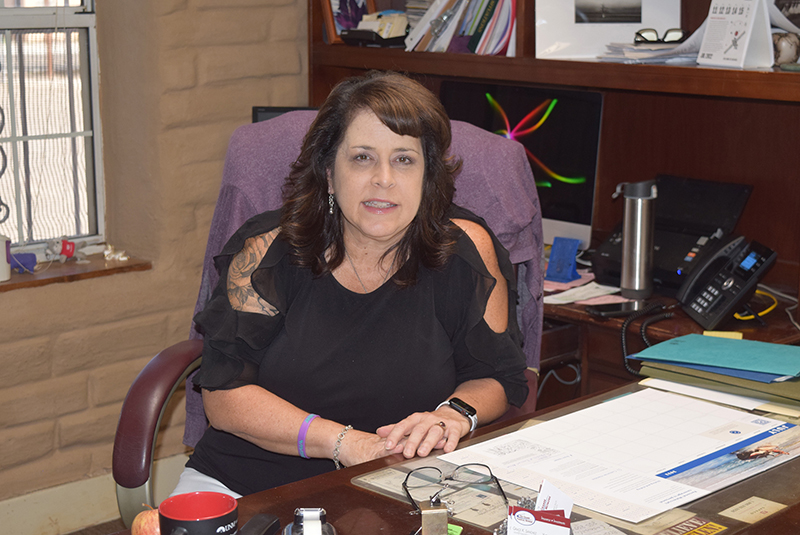

When it comes to the overall economy and the stock market, the word often used to describe both these days is “volatile.”
In recent months inflation is up, Wall Street is down, and for those who are watching their investments and retirement accounts, “panic” is a word that has also been heard.
That feeling is understandable, so we went to several Valencia County financial advisors to get a better understanding of the big picture and what we can do to ease our fears.
Justy Armijo is the director of investment services for Nusenda Credit Union. Yvonne Sanchez, of Rio Grande Financial Network of Los Lunas, has more than 30 years of experience advising clients. Both believe investors should stay patient.
“The stock market has always outperformed every other asset class,” Sanchez said, “and this is not the time to panic and sellout. You’ve got to kind of ride out this storm and be confident that in our country, we’re going to get through this.”
Armijo has a similar belief.
“The current state of the markets will work itself out,” Armijo said.
Do we just hold our breath until the upturn arrives? Not according to Sanchez, who recommends being proactive with your financial portfolio. Know what is in it. Know where you stand.
Work with your company’s financial planner or another financial agent or banker to make sure your investments are diversified and balanced, lowering the risk factors.

Mike Powers | News-Bulletin photo
Yvonne Sanchez, Rio Grande Financial Network financial advisor and owner, recommends finding a financial advisor you are comfortable with, keep a close watch on your investments, and stay calm during rocky financial patches.
Of course, every personal situation is different. Sanchez says people who are approaching retirement should consider becoming more conservative with their investments.
“If you are within five years of retirement, hopefully you are already converting your portfolio; transitioning it into a more conservative portfolio, where you are not 100 percent into a stock or equity market-maybe 25, 35 percent so you can kind of ride that out,” Sanchez said.
Armijo says retirees who plan to use investments to help fund retirement income need a plan to make sure they do not come up short.
“That is the No. 1 factor we see retirees face — not enough money,” he said. “As for young individuals, start investing and planning now, and when you can, increase the amount you are investing.”
According to Sanchez it is always a good idea to take a look at the household budget, particularly for those on a fixed income, like Social Security.
Is there anything to trim? Can you eat out less and brown bag more? And don’t be afraid to negotiate.
“Call up your cable company, your phone (company,)” Sanchez says. “See if there’s anything you can negotiate with them to lower your prices to give yourself a little bit of cushion.”
That includes insurance companies, who may be able to find you a lower rate.
Aside from “playing” the stocks, there are other ways to invest your money.
“Bonds, CD’s(certificates of deposit) savings accounts, money market accounts and more,” Armijo says, adding, “Investors can look at fixed annuities and fixed indexed annuities as an alternative, safe investment.”
“There are tens of thousands of different types of investments out there, and definitely safer investments,” according to Sanchez. “Cash is probably the safest, but with inflation, your dollar is probably not buying as much and you are not making anything on that.”
If you do have extra cash available, there are opportunities out there. Sanchez suggests consider buying more shares when the market is down.
If you are investing through a company account, Armijo says take advantage of it.
“Increase the amount you are contributing if possible to align with salary increases. Also take advantage of employer matching contributions because that is free money!”
The bond markets and certificates of deposit, CD’s, are consistently reliable and stable investment resources, although generally without big returns. But they too can be impacted by the rise and fall of interest rates, which the Federal Reserve has been hiking to combat inflation.
“With a rising interest rate environment,” Sanchez says, “you don’t want to lock into a five or 10 year CD because you are locking in when the rate is low.”
Ultimately, investors should ask tough questions, Armijo says.
“What are their financial goals? What is their tolerance for risk? Do you foresee a need for liquidity (or cash on hand?)
Sanchez recommends finding a financial advisor you are comfortable with, keep a close watch on your investments, and stay calm during rocky financial patches.
“I strongly believe that we are a very resilient nation,” she said.
Five things you need to know to ride out a volatile stock market
- Watching from the sidelines may cost you
When markets become volatile, a lot of people try to guess when stocks will bottom out. In the meantime, they often park their investments in cash. Consider that on average, for the 12 months following the end of a bear market, a fully invested stock portfolio had an average total return of 37.1 percent. However, if an investor missed the first six months of the recovery by holding cash, their return would have been only 7.6 percent.
- Dollar-cost averaging makes it easier to cope with volatility
Dollar-cost averaging can help reduce anxiety about the investment process. Simply put, dollar-cost averaging is committing a fixed amount of money at regular intervals to an investment.
- Now may be a great time for a portfolio checkup
Is your portfolio as diversified as you think it is? Meet with your financial professional to find out. Your portfolio’s weightings in different asset classes may shift over time as one investment performs better or worse than another.
- Tune out the noise and gain a longer-term perspective
To put your own investment plan in a longer-term perspective and bolster your confidence, you may want to look at how different types of portfolios have performed over time.
- Believe your beliefs and doubt your doubts
There are no real secrets to managing volatility. Most investors already know that the best way to navigate a choppy market is to have a good long-term plan and a well-diversified portfolio.
Source: Franklin Templeton
(For more details, go to this article on news-bulletin.com.)
Five steps to being financially healthy
- Evaluate your expenses
You may have a general idea of what your regular expenses are, but it’s a good idea to look at your bank statements to get a better picture of exactly how much money you spend.
- Increase your net income
Everyone wants to make more money, but unfortunately, that’s not something you have a lot of control over. Increasing your net income isn’t only about earning more – it’s also about spending less.
- Pay of debt
Paying off your debt can have a significant impact on the health of your finances. Having debt is often unavoidable, but the kind of debt that overwhelms your life is not financially healthy.
- Create a financial buffer
A financial buffer can come in the form of a designated emergency fund or adding to your existing savings account. What matters is that you have funds for the unexpected.
- Start saving for the future
The hardest part about saving for retirement is getting started. But starting to save now will better serve you in the future.
*Source: Rio Grande Financial Network
Variables that determine how inflation may impact your budget include:
- Household size
- Where you live
- If you own or rent your home
- Whether you work from home or commute daily
- Childcare costs
- Health care expenses
- How often you travel or dine out, etc.
*Source: Rio Grande Financial Network
- Those with a plan are 2.5 times more likely to save enough for retirement
- Those with a plan are 10 times more likely to reach their financial goals
- 68 percent of people who have a financial plan also have an emergency fund
Source: 2019 Schwab Modern Wealth Survey
Click the advertisement above to learn more about our Lessons for Living series sponsor, Nusenda Credit Union
Mike Powers spent more than 40 years as a television news and sports anchor, mostly in the Albuquerque market. He has won numerous awards including New Mexico Sportscaster of the Year. He covers a wide range of sports, including the Valencia County prep scene.

















